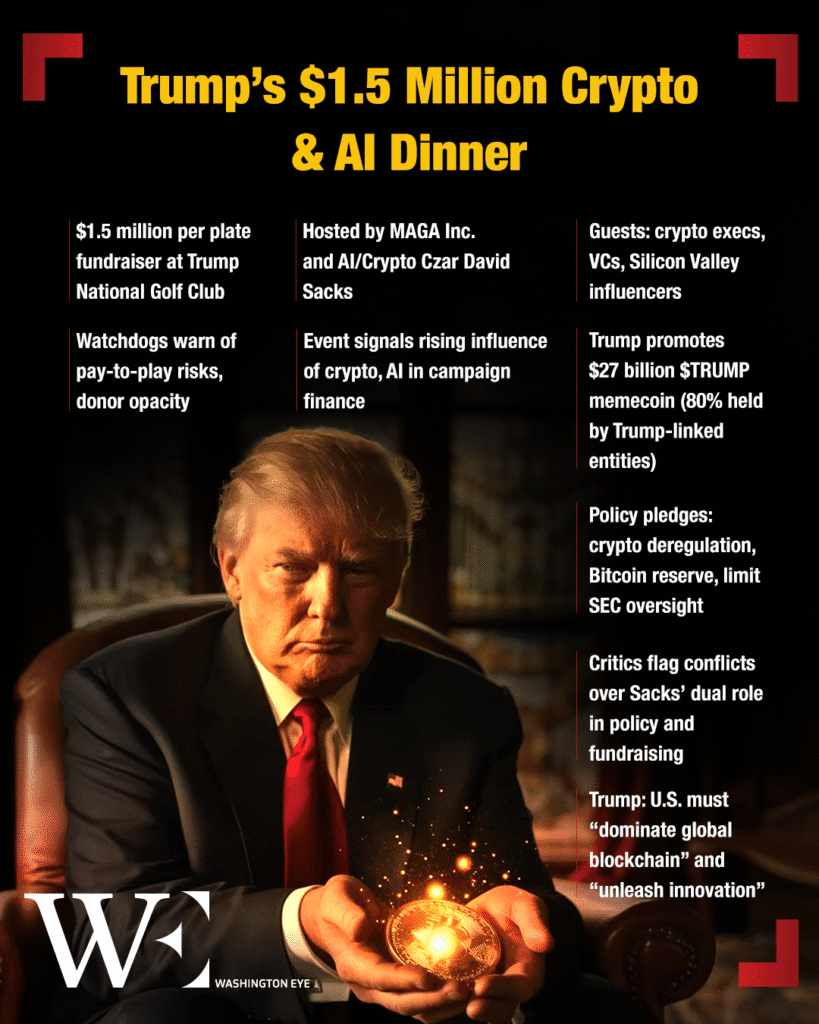President Donald Trump hosted one of the most high-stakes political fundraisers in American history—a $1.5 million-per-plate dinner at his Trump National Golf Club in Sterling, Virginia. Framed as the “Crypto & AI Innovators Dinner”, the event was organized by the super PAC MAGA Inc. and co-hosted by tech investor David Sacks, who currently serves as the administration’s official AI and Crypto Czar. With a guest list filled with cryptocurrency executives, venture capitalists, and Silicon Valley influencers, the evening marked a defining moment for the intersection of tech industry influence and American campaign finance.
Crypto Campaigning: A Digital Vision for American Finance
President Trump’s renewed embrace of cryptocurrency is emblematic of his administration’s broader economic strategy. In early 2025, Trump backed the launch of the $TRUMP memecoin—now reportedly valued at over $27 billion, with approximately 80% of the supply held by entities connected to Trump himself. The dinner offered a dual-purpose platform: raising money for Trump’s political operation and signaling policy commitments to deregulate crypto markets, establish a federal Bitcoin reserve, and position the U.S. as a leader in blockchain adoption.
According to reports, donors discussed not only campaign strategy but also regulatory roadmaps, including plans to shield crypto startups from current Securities and Exchange Commission oversight. The implication is clear: Trump’s political machine is tightly integrated with crypto-sector ambitions, blending campaign finance with an emerging digital policy agenda.
Conflict or Strategy? Ethics in the Spotlight
The event has prompted new ethical questions around the President’s dual role as both a policymaker and a crypto-adjacent businessman. Critics, including Senators Elizabeth Warren and Sherrod Brown, have flagged the involvement of David Sacks—a top policy official and political fundraiser—as a potential conflict of interest. Sacks’ influence over crypto regulation while co-hosting a $1.5 million fundraiser featuring major crypto stakeholders challenges conventional boundaries between governance and private interest.
More broadly, watchdog groups have raised alarms over the opacity of MAGA Inc.’s donor relationships and the risks of pay-to-play perceptions. The combination of direct financial contributions and potential policy advantages for attendees has revived calls for tighter restrictions on campaign fundraising linked to sectors directly affected by federal policy.
Financial Innovation or Political Leverage?
To Trump’s supporters, the dinner represents forward-thinking leadership that welcomes innovation into the political mainstream. The inclusion of crypto and AI pioneers at the highest levels of campaign planning suggests a pivot toward a new class of political donors—and possibly, a new governing philosophy focused on digital-first economics. Trump’s remarks at the dinner reportedly emphasized America’s need to “dominate” the global blockchain ecosystem and “unleash private innovation without bureaucratic roadblocks”.
However, this approach raises structural questions about who gets a seat at the table. As the crypto sector gains privileged access to policymakers, other constituencies may find themselves without equivalent representation—an imbalance that could shape future debates over regulation, innovation, and economic inclusion.
Redrawing the Lines: What This Means for U.S. Politics
The scale and nature of this fundraiser underscore a fundamental shift in how American presidential campaigns may be financed in the years ahead. Trump’s alignment with crypto capital is not only strategic—it’s symbolic. It represents a convergence of finance, technology, and governance in which political power is increasingly mediated through venture capital and digital assets.
As Trump eyes a second full term and the possibility of reshaping the federal government’s approach to technology and finance, the $1.5 million-a-plate dinner will be remembered not just for its exclusivity but for its implications: a political economy where innovation and influence are increasingly two sides of the same coin.
A Final Note
President Trump’s $1.5 million-per-plate dinner reflects a new scale of political fundraising that prioritizes exclusivity and access at unprecedented levels. While the involvement of tech and crypto leaders underscores the administration’s openness to innovation, the primary significance of the event lies in what it reveals about campaign finance strategy and governance priorities. As high-dollar contributions become increasingly entangled with policy influence, the challenge ahead will be maintaining democratic transparency and accountability amid growing financial and technological complexity.














